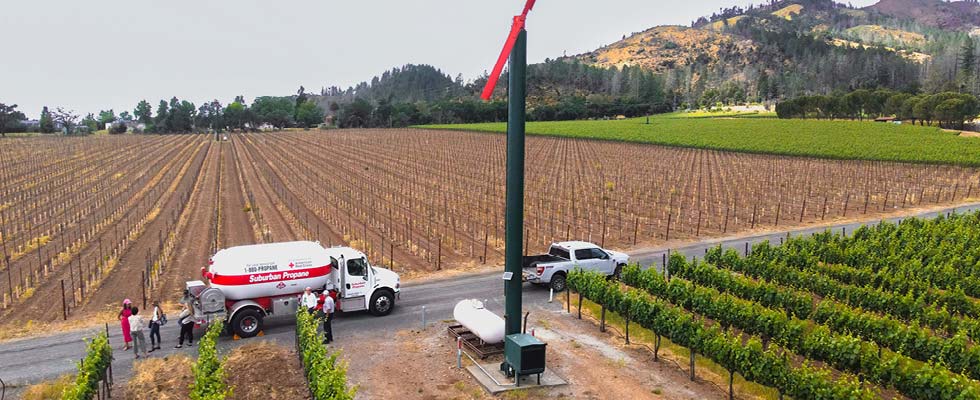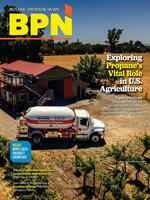
Whether at an industry event, a personal dinner or even just relaxing after a long workday, many people enjoy a nice glass of wine. And whether it’s red, white or a blend, that nice glass of wine comes from a hardworking vineyard that cultivates the perfect flavor. It’s easy to take that glass for granted, but behind the scenes, there’s a whole system that allows you to hold that glass in your hand. That system involves many components, and propane plays a critical role in the process.
Suburban Propane is a supplier of propane to several vineyards in and around the Napa Valley area, and the fuel allows for smooth operations year-round, even when winter weather creates challenges. Suburban’s Ken Pittam, general manager in California, and John Borgna, regional sales and business development manager in New York, shared details on how the company works with vineyards to ensure propane fuels their essential functions.
Can you give background on Suburban Propane’s work with the ag sector?
With over 95 years of experience, Suburban Propane operates in 42 states across the U.S., serving a significant number of customers in the agricultural sector, including farms, vineyards, dairy farms, ranches, cannabis growers, distilleries and greenhouses. Farmers and agricultural business owners work with Suburban Propane to power their equipment, tools and machinery, ensuring their operations run smoothly.
Propane is the energy source of choice for many farms and vineyards across the U.S. due to its efficiency, cost-effectiveness, portability and dependability. As an environmentally friendly fuel source, propane burns cleanly and produces fewer emissions than other fossil fuels like gasoline and diesel. This results in fewer pollutants and a lower environmental impact, making propane a more sustainable choice for agricultural operations.
What type of services do you provide for ag customers?
- Crop drying — Propane is an excellent fuel source for crop drying. Agricultural operations can use propane-powered grain dryers to remove moisture from harvested crops, allowing them to be stored safely without spoiling.
- Irrigation — Propane can power irrigation pumps, essential for delivering water to crops in areas with limited water supply or for drip irrigation. Propane-powered irrigation pumps are valuable in remote locations where traditional power sources are unavailable. Farms, vineyards and orchards often rely on propane-powered irrigation systems.
- Heating — Propane is a popular fuel source for heating livestock buildings, barns, tasting rooms, outdoor spaces and other farm buildings, as well as preventing grapevines from freezing during colder months. Propane-powered heaters are portable, easy to set up, and provide safe and efficient heating for livestock and grapevines alike.
- Hot water for dairy farms — In dairy milking applications, milking equipment and piping require sanitization, which involves running temperature-controlled hot water through the system. Propane is a reliable and efficient energy source for firing boilers and hot water heaters used in agricultural settings.
- Backup power source — Propane-powered generators provide backup power for agricultural operations during power outages. This is crucial for operations relying on electrically powered equipment, such as dairy farms and vineyards. Dairy farmers use propane-powered generators to keep their milking equipment operational, and vineyards use them to maintain proper temperatures in wine making and storage areas.
- Frost protection — Propane is a clean fuel source for wind machines that prevent frost accumulation on citrus during their delicate development stage. These machines also protect nut trees from heavy freezes, extending their life span.
- Equipment power — Propane fuels vital vineyard equipment like forklifts, mowers and utility vehicles, offering reliable power with lower emissions than gasoline or diesel engines. This cleaner fuel enables vineyard operators to reduce environmental impact while efficiently managing their vineyards.
In your view as a marketer, why is propane the fuel of choice for frost protection in vineyards?
Suburban Propane supplies large quantities of propane to vineyards both within and outside Napa Valley, California. Propane is the preferred fuel for frost protection due to its portability. Propane tanks can be set up anywhere in the vineyard to provide heating or power fans to distribute the heat. It is dependable, not reliant on the electric grid and environmentally friendly, burning cleanly and producing fewer emissions than other fossil fuels like gasoline and diesel. This results in fewer pollutants and a lower environmental impact, making propane a more sustainable choice for agricultural operations. Additionally, propane can be stored indefinitely in LP tanks, unlike diesel or gasoline.
What type of propane-powered equipment do vineyards use for said frost protection?
In colder months, vineyards combat frost risk with propane heaters and wind machines to safeguard delicate grapevines. This strategically positioned equipment maintains consistent warmth, preventing frost from accumulating on the fruit and killing the vines, thus ensuring a successful harvest.
What advantages does propane provide for vineyards in terms of powering equipment, environmental benefits, cost, etc.?
Vineyards, with a demand for efficiency and sustainability, depend on a variety of tools for cultivation. Propane emerges as a crucial resource, providing clean, portable energy that delivers flexibility, affordability and reliability to both owners and workers.
In powering essential vineyard equipment such as forklifts, mowers and utility vehicles, propane offers dependable performance with reduced emissions compared to gasoline or diesel engines. Additionally, propane generators serve as backup power sources, guaranteeing continuous operation of irrigation systems during power outages. By opting for this cleaner fuel, vineyard operators can minimize environmental impact while effectively managing their vineyards.
How does propane compare to other energy options in not affecting the flavor profile of the crop?
Propane is the ideal option for vineyards, as it does not infiltrate the soil or alter the terroir, preserving the distinct flavor profile imparted by the earth where the grapes grow. Utilizing propane-powered heaters and fans during colder months aids in safeguarding the vineyard’s grapevines while maintaining an environmentally friendly approach.
About how much propane does the average vineyard use to protect its grapevines in the winter?
Propane usage varies depending on weather conditions, with colder temperatures typically necessitating more frost protection compared to warmer weather. Additionally, the size of the vineyard operation plays a significant role, with propane consumption ranging from hundreds to thousands of gallons per year.
Are there additional ways that vineyards put propane to use other than frost protection? Where have you noticed the greatest benefits realized by your customers?
Beyond frost protection, vineyards rely on propane to maintain consistent temperatures in tasting rooms, storage facilities and winemaking areas. This is particularly crucial for vineyards on the West Coast, where electric grid failures are not uncommon. Propane-powered heating and cooling systems play a vital role in ensuring uninterrupted operations during such events.
Furthermore, propane serves multiple other essential functions in vineyard operations, including powering equipment, aiding in weed control, mitigating pests and supporting hospitality services.
Do your bobtail drivers experience any delivery challenges due to weather situations in the winter season? How does Suburban work to mitigate those challenges?
One challenge we encounter arises when the driveway or facility entrance becomes inaccessible due to inclement weather. In such cases, we take a proactive approach by adjusting our routes beforehand if bad weather is forecasted. Additionally, when serving customers with difficult driveways or entrances, we make courtesy calls to remind them of our visit, allowing them ample time to clear a path to their tank.
How does Suburban work with customers in emergency or unexpected cold weather situations to protect the crop?
Weather can swiftly change, often contradicting forecasts. Suburban Propane maintains a dedicated team ready for immediate action when the need arises. These teams mobilize within minutes and work tirelessly to safeguard crops for growers.
For our vineyard customers, direct access to the local manager ensures rapid response in emergencies. Building a strong customer relationship and fostering open communication is paramount. This ensures customers understand our 24/7 availability, ready to provide emergency delivery service at a moment’s notice to protect crops from potential cold weather damage.
Why is it important for vineyards to prepare for the cold season with their propane provider?
Frost protection measures should be implemented ahead of each growing season. Ideally, fuel tanks should be set up when weather conditions are favorable, as challenging terrain can limit access to fields, making installations difficult (although we have successfully managed such situations in the past).
To ensure readiness for potential frost days, we take a proactive approach by reaching out to our customers with wind machines during the fall to ensure their tanks are full and prepared. Investing in these resources ahead of adverse weather is a strategic business decision.


